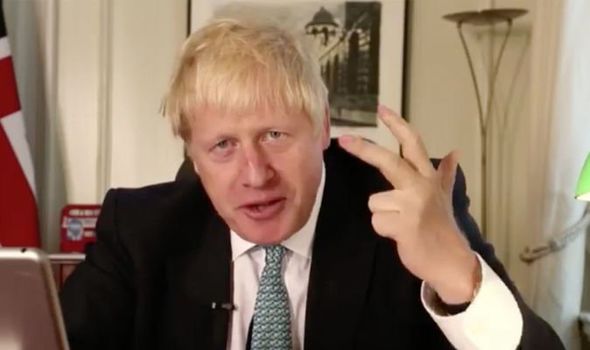Is it too early to demand an investigation into the naked Covid-19 cronyism that has cost so much cash – and so many thousands of lives?

Two-fingered salute: this will be the likely response if we ask Boris Johnson politely for an inquiry into his procurement methods for Covid-19-related equipment and services.
Listen to the following video from our old friend Jeremy Corbyn:
The government has handed billions of pounds to the private sector throughout the pandemic.
It's been a disaster.@jeremycorbyn is right. The government should put the NHS, public health teams and primary care services in charge of the pandemic response.pic.twitter.com/FDjYM63fTc
— We Own It (@We_OwnIt) November 24, 2020
He’s right about the cronyism. The New York Times – a US newspaper and one from a country that supports private enterprise over socialism – recently ran an article examining the phenomenon.
Its findings were an indictment against Boris Johnson and his ragtag gaggle of freeloaders, for whom the phrase, “We’re all in it together,” actually means, “Everyone for themselves!”
Under the heading Waste, negligence and cronyism: inside Britain’s pandemic spending, the paper stated: “In the desperate scramble for protective gear and other equipment, politically connected companies reaped billions.”
It began: “When the pandemic exploded in March, British officials embarked on a desperate scramble to procure the personal protective equipment, ventilators, coronavirus tests and other supplies critical to containing the surge.
“In the months following those fevered days, the government handed out thousands of contracts to fight the virus, some of them in a secretive “V.I.P. lane” to a select few companies with connections to the governing Conservative Party.”
The paper said it analyzed the roughly 1,200 central government contracts that have been made public, together worth nearly $22 billion (£16.28 billion):
About $11 billion [£8.14 billion] went to companies either run by friends and associates of politicians in the Conservative Party, or with no prior experience or a history of controversy.
Meanwhile, smaller firms without political clout got nowhere.
It said the procurement system was cobbled together during a meeting of anxious bureaucrats in late March, and a wealthy former investment banker and Conservative Party grandee, Paul Deighton, who sits in the House of Lords, was later tapped to act as the government’s czar for personal protective equipment.
Eight months on, Lord Deighton has helped the government award billions of dollars in contracts –– including hundreds of millions to several companies where he has financial interests or personal connections.
It looks like we should start making a list of names in advance of a future corruption inquiry, and this Lord Deighton should be at the top of it!*
That’s if we ever get all the information…
Citing the urgency of the pandemic, the government cast aside the usual transparency rules and awarded contracts worth billions of dollars without competitive bidding. To date, just over half of all of the contracts awarded in the first seven months remain concealed from the public
The paper mentions some of the firms with Tory connections that received funding:
Uniserve Group: Awarded $1 billion in PPE contracts, the company is among the biggest winners. Its founder is an adviser to a pro-Brexit think tank panel chaired by two prominent government ministers.**
Randox Laboratories: Awarded $646 million in testing contracts. Owen Paterson, a government minister [and another name for our list], is a paid consultant for the firm.**
Deloitte: Awarded a contract to consult on PPE procurement retrospectively and without competition. The company has made non-cash donations to the Conservative Party and others.**
Around $6 billion went to companies that had no prior experience in supplying medical personal protective equipment. Fashion designers, pest controllers and jewelers won lucrative contracts.
PPE Medpro: This company won its first contract barely three weeks after it was set up. It went on to win nearly $274 million in PPE contracts.**
Ocean Footprint: The marine equipment supplier was awarded a $7 million contract without having any prior experience in supplying medical PPE.**
PestFix: The pest control supply firm won more than $470 million in PPE contracts. It supplied 600,000 face masks that could not be used for their original purpose.**
More than $5 billion was awarded to companies with histories of controversy, from tax evasion and fraud to corruption and human rights abuses.
KPMG: Its UK arm recently faced a negligence lawsuit over alleged accounting failures linked to the collapse of outsourcing giant Carillion.**
Serco: Awarded $285 million for testing and contact tracing. The company admitted… defrauding the government and paid a $30 million fine in 2013.**
Honeywell: Embroiled in two global bribery probes. The UK PPE czar is a shareholder.**
All of the companies named by the NYT have denied wrongdoing, and there is no evidence to suggest that government officials were engaged in illegal conduct.
But there is ample evidence of cronyism, waste and poor due diligence. Some of it has been documented by the British media, but the scale of the problem is wider than previously known.
Officials ignored or missed many red flags. Dozens of companies that won a total of $3.6 billion in contracts had poor credit, and several had declared assets of just $2 or $3 each. Others had histories of fraud, human rights abuses, tax evasion or other serious controversies. A few were set up on the spur of the moment or had no relevant experience — and still won contracts.
The paper contacted the Department of Health and Social Care, which led the Tory government’s pandemic procurement. In denial of all the evidence, a spokesperson said that “proper due diligence” was carried out for all contracts.
How can it have been?
Did this person mean that they ran all the necessary checks, saw the information that showed the firms were not suitable to receive these huge contracts (and this huge responsibility), and handed over the cash anyway?
If so, then the government was negligent. Considering the system as described here, this seems likely:
Junior staffers reviewed thousands of proposals and passed on a chosen few to their bosses, who often had only a day to sign off on contracts, according to a government official involved in the process. Some businesses said they were left waiting months as their proposals went unanswered. Others said it was difficult to keep up with what the government wanted, with safety specifications sometimes changing after deliveries had already been made.
Normally, companies would bid on individual contracts with requirements published in advance. But given the government’s frenzied need for supplies, most companies simply submitted broad proposals through a government website. Government officials then decided yes or no, or in some cases approached companies themselves.
The race to procure PPE – Personal Protective Equipment – is a very clear example (and a sore point for the government).
The necessity to have such equipment easily available in readiness for the arrival of a pandemic infection like Covid-19 was highlighted by Exercise Cygnus in 2016 – the Tory government’s own simulation of the effect of a pandemic on the UK which predicted that the NHS would collapse due to lack of resources – and by top medical journal The Lancet, which published a direct warning to Boris Johnson that he needed to secure “supply chains of pharmaceuticals, personal protective equipment, hospital supplies and the necessary human resources” on January 24.
Johnson ignored the warnings. In fact,
Ministers could have avoided the panicked spending spree, critics said, had they not ignored their own pandemic preparedness plan and sold off stocks of P.P.E. from rainy-day reserves in the first three months of the year.
So the government’s claim that
the huge global demand for P.P.E. had created “a highly competitive market” and that it used “the quickest and most accessible routes” to buy protective gear
appears to be nonsense.
Having given way his own supply of PPE, Johnson then had to scrabble to buy some back. You can bet he had to spend more doing this than he raised from the sale, too – those are the laws of supply and demand and as a Tory, he should have known such things. But his people’s behaviour was actually worse:
In choosing speed over due diligence, however, ministers squandered millions on “unsuitable” items, including some that did not meet safety standards, according to the National Audit Office.
The government said that only a tiny portion of the supplies, 0.5 percent, had been found unfit for their intended uses.
Yes, but then the government said it followed due diligence in awarding contracts to unsuitable firms as well, so its people are hardly to be trusted.
The VIP lane
As if the above information wasn’t bad enough, Matt Hancock (another name for our list) secretly authorised a so-called “VIP lane” for favoured companies to win procurement contracts, in April.
These firms
proved to be 10 times more likely to win contracts than those outside that group, according to the National Audit Office.
The government did not carry out systematic company checks, including for potential conflicts of interest, until it had already spent nearly $2 billion, auditors found. Officials did not always document who recommended a company or why it was awarded a contract.
This site has already documented the story of Ayanda Capital. Awarded $340 million (£251.6 million) to supply personal protective equipment, it eventually delivered 50 million masks worth more than $200 million (£148 million) that could not be used for their original purpose, because the ear loop fastenings did not match the government’s new requirements.
One of the firm’s senior board advisers was Andrew Mills (another name for our list) who also worked on the government’s Board of Trade, meaning there was a clear conflict of interest even though we don’t know what part he played in the awarding of the contract, if any.
Ayanda has said the masks met all the government’s requirements when the order was placed and – considering the evidence that requirements were likely to change after contracts were signed – it is entirely possible that this is true. It is the fault of Boris Johnson and his government that this process failed. They chose to employ firms that were unable to provide the equipment that was needed.
Meanwhile,
many companies and business people, often better qualified to produce P.P.E. but lacking political connections, had no access to the V.I.P. lane. Multibrands International, a British manufacturer that had been producing P.P.E. for China since December, was among them. Its owner, Rizwana Hussain, spent months trying to reach government officials through public channels.
Ms. Hussain had offered to supply the government starting in March, her emails show. She was still at it in early May when news broke that 400,000 protective gowns that the government ordered from Turkey had proved to be unusable. “I was so upset thinking, ‘Why are we listening to these disastrous happenings when we’re here and are offering our help?’” Ms. Hussain said.
She said that although her company could produce large quantities of P.P.E. at its factories in China and India, she never heard back from the government.
Government officials said the high-priority lane was set up to efficiently prioritize credible offers of PPE for the National Health Service, and that all proposals, whatever channel they went through, were assessed by the same standards. Does anybody really believe that?
But they have not released the names of the nearly 500 companies that made the V.I.P. list., fuelling questions of cronyism.
It seems clear there is enough evidence here – or lack of it, in many instances – to justify an inquiry. This Writer, being a lay person, is unsure what form such an investigation should take. Judicial review? Public inquiry? Perhaps somebody with more specialised knowledge could let us know.
We already know that Johnson will try to brush this scandal under the carpet (his carpets must be bulging with the amount of mess he has hidden beneath them).
It is our responsibility to ensure that he doesn’t get away with it.
*The New York Times had quite a lot to say about Lord Deighton:
Two of the contracts linked to Lord Deighton were P.P.E.-related. One, for $78 million, was awarded to Honeywell Safety Products, a subsidiary of Honeywell International, a company he holds shares in.
Lord Deighton is also a shareholder of AstraZeneca, the British pharmaceutical company that is developing a vaccine with Oxford University, and was awarded $205 million for test services.
He also holds shares in the consulting firm Accenture, which was awarded a $5.6 million contract to help develop England’s ill-fated contact tracing app and detect fraud in procurement. Another company he has a stake in, UBS, won $770,000.
Neither Lord Deighton nor the companies would divulge the size of his share holdings.
A $406,000 contract was awarded to a consulting firm, Chanzo, to help set up and run the P.P.E. procurement system, including providing a chief of staff for Lord Deighton.
Chanzo’s founder and chief executive, Jean Tomlin, is a long-time business associate of Lord Deighton, and worked with him on the Olympic committee. Ms. Tomlin is also a fellow director at Hakluyt, a corporate intelligence firm founded by former British intelligence officers, which Lord Deighton chairs.
Lady Alison Deighton, his wife, is a former director of N.M. Rothschild, which won a $770,000 contract for consulting services. Another consulting contract of the same value went to Moelis & Company, an investment bank where one senior adviser and Labour peer, Lord Charles Allen, was also on the Olympic committee board with Lord Deighton.
** The article also provides the following information on the companies it names:
PestFix said it had repurposed its business during the pandemic to supply medical P.P.E. and said the government changed its specifications after it had supplied the face masks. PPE Medpro said that it was awarded contracts based on the considerable experience and expertise of its staff. Uniserve Group said that its director had no connections to the Conservative government. Deloitte said that its U.K. arm does not give cash contributions to political parties. Ocean Footprint said it had previously sold masks to the boat-building industry. Serco said that it “took significant steps to reform itself” after the 2013 fraud scandal. Randox Laboratories did not respond to questions and Owen Paterson declined to comment. All other companies mentioned in the article either declined to comment or did not respond to questions.
Have YOU donated to my crowdfunding appeal, raising funds to fight false libel claims by TV celebrities who should know better? These court cases cost a lot of money so every penny will help ensure that wealth doesn’t beat justice.
Vox Political needs your help!
If you want to support this site
(but don’t want to give your money to advertisers)
you can make a one-off donation here:
Here are four ways to be sure you’re among the first to know what’s going on.
1) Register with us by clicking on ‘Subscribe’ (in the left margin). You can then receive notifications of every new article that is posted here.
2) Follow VP on Twitter @VoxPolitical
3) Like the Facebook page at https://www.facebook.com/VoxPolitical/
Join the Vox Political Facebook page.
4) You could even make Vox Political your homepage at http://voxpoliticalonline.com
And do share with your family and friends – so they don’t miss out!
If you have appreciated this article, don’t forget to share it using the buttons at the bottom of this page. Politics is about everybody – so let’s try to get everybody involved!
Buy Vox Political books so we can continue
fighting for the facts.
The Livingstone Presumption is now available
in either print or eBook format here:
Health Warning: Government! is now available
in either print or eBook format here:
The first collection, Strong Words and Hard Times,
is still available in either print or eBook format here:









If there was it would be a white wash they fraudulent trading has much it’s criminal but justice the peasants won’t see that